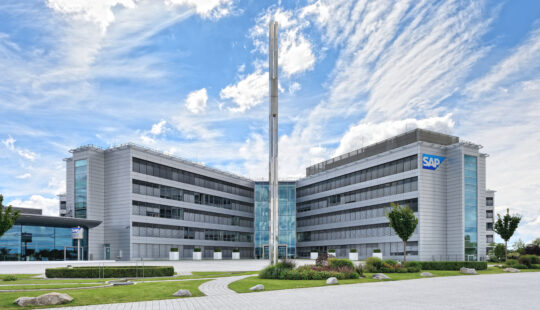How would you describe inclusion? Inclusion means inviting everyone to the table who wishes to have a seat, creating a sense of belonging and empowering everyone to feel comfortable in their own skin.
Inclusion is a choice and a commitment, while belonging is a feeling that results from our actions. To strive for inclusion, SAP leads with compassion, support, and acceptance for all backgrounds and aims for diversity in all fields.
SAP is committed to full spectrum diversity, inclusive of gender, age, race, ethnicity, orientation, ability, nationality, religion, veteran status, background, culture, experience, strengths, and perspectives. Living up to this commitment, SAP engages in a broad range of initiatives, promoting diversity, inclusion, and equality — including programs that foster more gender equality in science, technology, engineering, and math (STEM) studies and the tech industry.
SAP at Grace Hopper Celebration
A recent example of SAP’s efforts in the field is the Grace Hopper Celebration 2022, the largest assembly of female technologists in the world and a conference that empowers women to pursue STEM careers in the name of Grace Hopper (1906-1992), an American computer scientist, pioneer in the field of data science, and one of the first females to rebuff stigmas attached to womankind. Grace Hopper Celebration 2022 ran from September 16 through 23 in Orlando, Florida.
As proud collaborator of the Grace Hopper Celebration, the Chief Trust office at SAP sponsored a skills development lab aimed to equip young women with the skills to succeed, be seen, and be hired in tech roles. The workshop, called “SAP ElevateHer Pitch Challenge” and held September 21, was a career development skills-building exercise. For one hour, SAP worked with approximately 400 attendees on site to masterfully craft their own personal elevator pitches to use in interviews or networking settings. Using the motto “Pitch Us With Your Shot,” the workshop infused gaming techniques with the challenge to further refine the participants’ skills.
Why are workshops and skills development labs like this one so important? Only 15 to 22% of professionals in data science-related roles are women, an under-representation in the field. This poses a constraint on talent for companies that are hiring, as data science is susceptible to bias and a wide range of views and expertise is essential for drawing relevant real-life connections. Data science and artificial intelligence (AI) becoming more ubiquitous by the day further fuels the issue.
In response, we need to lay a foundation for the next generation by creating equal opportunities and access to knowledge and skills. Promotion and communication amount to nothing if the status of unequal access is further perpetuated. To create a sustainable and long-lasting impact, aspiring data scientists need to connect with practitioners and role models.
SAP at WiDS
Dedicated to creating this kind of exchange, in May 2022, SAP hosted the Women in Data Science (WiDS) conference. The program was introduced by Stanford University in 2015 and has developed into a global movement inspiring people all over the world. Its efforts include conferences, data-thons, podcasts, educational outreach programs, and workshops, and its goal is to advocate for data scientists worldwide to educate themselves regardless of their gender and despite barriers they must overcome. SAP has been a proud collaborator and sponsor since 2016.
This year, participants were taken on a virtual data science tour from Tokyo to Palo Alto. Around 50 female data scientists joined forces and delivered live content on the matter for more than 10 hours. Thanks to the female forerunners’ efforts and insights on topics such as AI, machine learning, data engineering, and human-centric data, approximately 700 participants were engaged in all corners of the world.
During her panel discussion, SAP Labs India Managing Director Sindhu Gangadharan said, “Data is the new gold in the digital economy and businesses are experiencing a gold rush. We need women to play a much bigger role in shaping the future of the data science domain. Women and data science are a perfect match. Data science needs skills that women bring to the table — insights as well as their perspectives.”
When asked about the lack of women in leadership positions in Asia, SAP Labs Japan Managing Director Hiromi Hara stated that women should make use of flexible work arrangements and not feel held back by gender roles.
Rising to the challenge, SAP has been named one of America’s best employers for women by Forbes, but the path to inclusion does not end here. To bring everyone to the table, SAP is making a proactive choice to be integrative and going the extra mile through programs such as “Empower Her,” the SAP Women in Tech initiative, and the Business Women’s Network.
Another initiative supporting these endeavors is the recent partnership with Penn State Brandywine. To level the playing field, SAP funds student memberships in Women in Cyber Security (WiCyS) and contributes to creating accessible and affordable experiential learning opportunities for the next generation of cybersecurity professionals.
The barriers for women in STEM careers persist, however. Inclusion is a never-ending job, a never-ending responsibility to be carried by companies. As Mary Shinn, managing director of SAP Korea, put it: “Through working in the field, we become role models for our children.” If the outlook of an inclusive tomorrow free from social constructs does not prove the value of a general feeling of belonging in the workplace today, what could?



